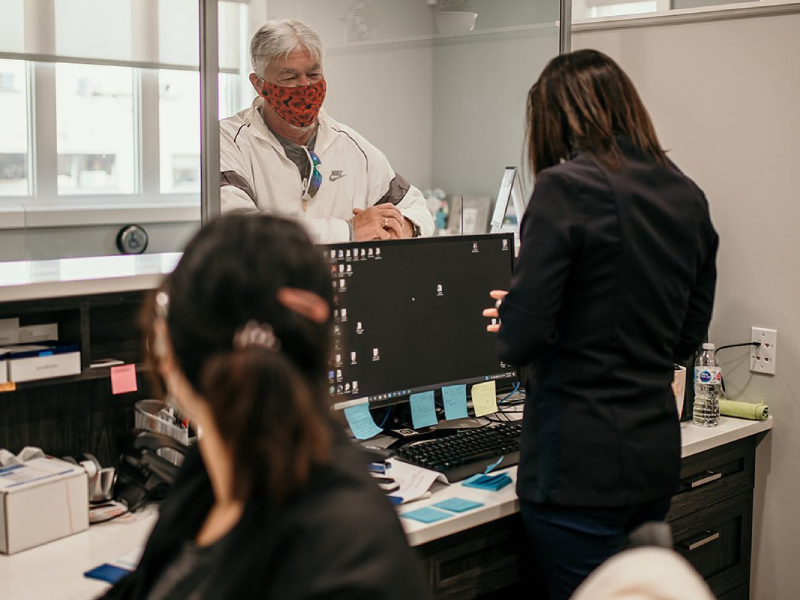
What is Dental Sleep Medicine?
Dental sleep medicine is an area of dental practice that focuses on the use of oral appliance
therapy (OAT) to manage sleep-disordered breathing, including snoring and obstructive sleep
apnea (OSA).
CPAP (Continuous Positive Airway Pressure) therapy is the gold standard for the management of
the medical condition of obstructive sleep apnea. The dental appliance option is available for
cases where CPAP is not possible or tolerated, and/or the Sleep Physician and patient have
chosen a dental appliance as the prescribed treatment choice.
Why is My Dentist Asking me about Snoring?
Snoring is more than just a sound that occurs during sleep. It is not uncommon for people to
ignore this phenomenon; however, snoring could be a significant indicator of health risks.
Your oral health and regular checkups are equally as important as annual exams with your family
doctor, eating healthy, being physically active, and avoiding tobacco and nicotine.
As part of a thorough dental exam, your dentist will check not only your teeth and gums, but
also jaw function, airway, and lifestyle to screen for factors that can put your health at risk.
Dr. Mansour and Team may recommend you see your Family Doctor or Renfrew County VTAC to request
a sleep study if you experience frequent snoring or other symptoms associated with a
Sleep-Related Breathing Disorder.
What is Obstructive Sleep Apnea?

Obstructive Sleep Apnea (OSA) is a chronic condition that occurs when your muscles relax during sleep, your soft tissue collapses, blocking your airway. This can cause you to stop breathing hundreds of times per night for anywhere from a few seconds to more than a minute at a time. These breathing pauses are followed by brief awakenings that disturb your sleep. It is a medical disease that should be diagnosed by a sleep doctor and then treated.
What are the Symptoms of Obstructive Sleep Apnea?
Symptoms of obstructive sleep apnea include loud or frequent snoring or silent pauses in breathing and choking or gasping sounds. Other common symptoms include:
- Waking in the morning feeling unrefreshed
- Being tired during the day
- Morning headaches
- Waking up frequently at night to go to the bathroom
- Difficulty concentrating or remembering things
What are the Risks of not Managing Snoring and Sleep Apnea?
- High Blood Pressure
- Stroke
- Heart Issues
- Blood Sugar and Metabolism
- Cancer
- Mental Health & Alzheimer’s
- Impaired Cognitive Functioning
- Fatigue Related Accidents and Injury
- Reduced Immune Health
How is Obstructive Sleep Apnea Diagnosed?
OSA must be diagnosed by a doctor, so you should ask your family doctor for a sleep evaluation. Your family doctor may provide a diagnosis or may refer you to a doctor who specializes in treating sleep problems. Your sleep evaluation may involve either an overnight sleep test at a sleep center or a home sleep apnea test (HSAT). A sleep specialist will interpret the data from your sleep test. The information from the evaluation and the sleep test results will be used to determine if you have OSA.
Some things to ask yourself…
- Do you snore?
- Do you wake up frequently throughout the night?
- Do you wake up feeling unrested?
- Do you lack energy during the day?
What are my options for my Sleep Study?
In-Lab Level 1 Sleep Study

- The gold standard test
- Provided at a medically supervised location, such as MedSleep in Pembroke Regional Hospital
- Requires a referral by your Family Doctor or Renfrew County VTAC (Virtual Triage & Assessment Centre)
Home Sleep Apnea Test (HSAT)

- Dr. Mansour evaluates your eligibility and refers you to SleepEfficiency where Andrew Holmes, RPSGT (Registered Polysomnographic Technologist) and Team arrange for your Home Sleep Apnea Test.
- testing equipment is sent to your home
- you sleep in your own bed for the test

